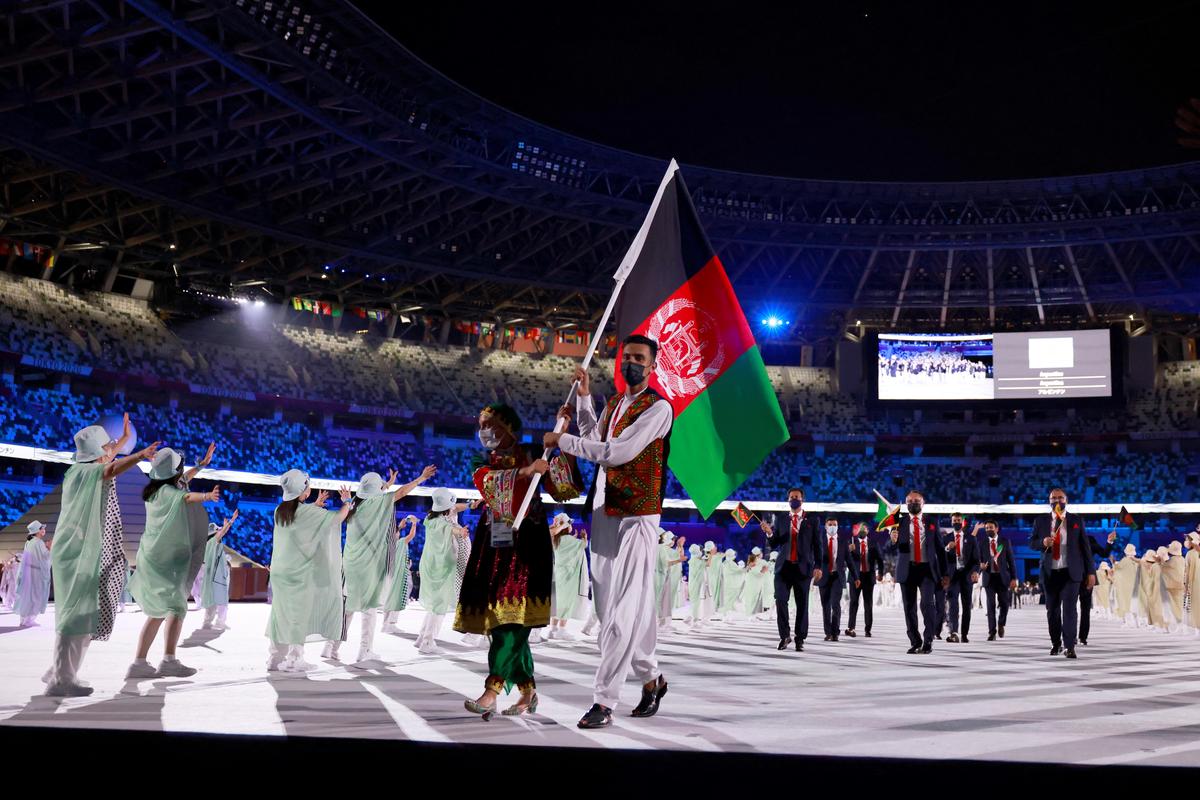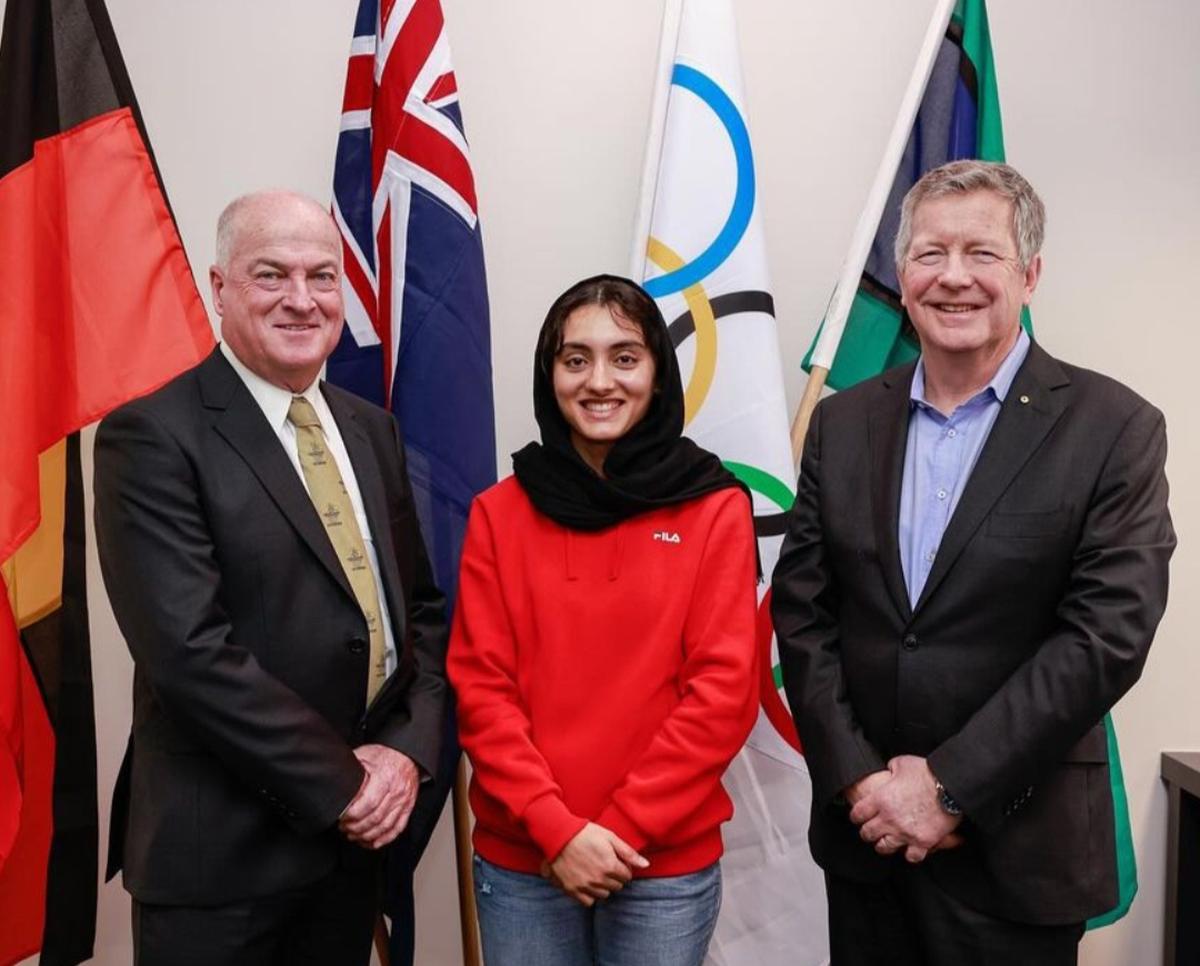The Olympics is not just a sporting extravaganza, itâs a melting pot of culture, tradition and style. But for Kimia Yousofi, the Paris Olympics is also a platform to represent the âstolen dreams and aspirationsâ of Afghan women, who face formidable hurdles under Taliban rule.
Kimia is among the six athletes from Afghanistan who will be competing under the national flag despite the Talibanâs seizure of power, Kimia wants to be the flag-bearer of change.
Three years ago, when she was, indeed, the official flag-bearer of Afghanistan at the Tokyo Games, little did Kimia know that it was her last flight from home. While she was running in the Olympics, the Taliban took over Afghanistan and as the country was in turmoil, Kimia, like many of her compatriots, could not head back home.
For a long period of time, she could not establish any contact with her folks back home, and with the situation deteriorating in Afghanistan with each passing day, Kimia decided to fly to Iran with the help of the International Olympic Committee (IOC). Iran was not a new country for her since she trained there before the Tokyo Games. But this time around, it was a different experience.
As uncertainty loomed large over her career, the IOC looked at Canada as her possible destination, but thatâs when the Australian Olympic Committee (AOC) showed keenness in bringing her to Sydney. Athletics Australia asked its coach John Quinn if he would be able to take care of the athlete and after the seasoned coach gave his consent, Kimia travelled to Australia in August, 2022, to start her new journey.
It was not easy to settle down in a country with a different culture and language, and by her own admission, Kimia felt alienated in the beginning. She could neither understand nor speak English, but with the help of the AOC and the Australian government, she eventually settled down in a quaint Sydney suburb, along with her mother and brother.
For Quinn, who has worked with refugee athletes in the past, the first challenge was to establish communication with Kimia and then get her back into shape.
âIt all came about when I received a call through the IOC about whether I would be prepared to coach this athlete who was living in exile from Afghanistan. I already had several refugees from different countries – predominantly Africans – in my squad. And thatâs how the IOC, through the AOC, knew about my coaching. So it seemed a pretty good fit. And it has been a good fit,â Quinn tells Sportstar from the Games village in Paris, where he is working with Kimia and five other Afghan athletes.

Kimia Yousofi (L) was one of Afghanistanâs flag bearers during the opening ceremony of the Tokyo 2020 Olympic Games, at the Olympic Stadium, in Tokyo, on July 23, 2021. (Photo by Odd ANDERSEN / AFP)
| Photo Credit:
ODD ANDERSEN
Kimia Yousofi (L) was one of Afghanistanâs flag bearers during the opening ceremony of the Tokyo 2020 Olympic Games, at the Olympic Stadium, in Tokyo, on July 23, 2021. (Photo by Odd ANDERSEN / AFP)
| Photo Credit:
ODD ANDERSEN
While Quinn admits that Kimia has âgrown enormously from this processâ, the sprinter does miss her home. âWhen Kimia first arrived in Australia, she could not speak English and I couldnât speak Farsi. And, that was challenge number one. And thank goodness for Google translation apps. And so all of our initial coaching was done on an app,â Quinn says.
âBut now we have progressed to the point where we donât need Google anymore. Kimia is very fluent in English and Iâve held my low level of Farsi, but she has come a long way. Whilst she still feels separated from her homeland, sheâs got a new home in Australia for nowâ¦â
Over the last couple of years, Kimia has followed a rigorous routine to chase her dreams of participating in whatâs going to be her third Olympics. For that, she has had to battle the odds, be vocal against the injustice faced by the women back home and give her all on the track.
Every 100m sprint seemed like a fight against the system, and crossing every hurdle, Kimia provided several Afghan women with a ray of hope. The Taliban does not recognise this six-member Afghanistan contingent in the Paris Games, and the team has been chosen by the exiled Afghan National Olympic Committee with full support from the IOC.
Dr Yonus Popalzay, the exiled president of the Afghanistan Olympic Committee, who played a key role in ensuring the participation of three Afghan women athletes for the first time in the Games, was grateful to the IOC and the Australian federation for backing Kimia. âWe highly appreciate AOC for the support extended to Kimia. On behalf of Afghanistan NOC please convey our message of gratitude and appreciation to the Australian nation and government for their support to the Afghans in a difficult time,â Popalzay says.
And, these efforts have, indeed, come as a shot in the arm for Kimia and her colleagues.
âThe athletes here represent the hopes and the dreams of the people of Afghanistan, and they look forward with hope and optimism to what the future may bring to them and return Afghanistan to them.
Many of the athletes that are here in the village are getting ready to compete. Itâs not about timings, itâs not about distances, itâs not about heights. Itâs about hope, itâs about belief, itâs about optimism. And I think itâs actually about the justice of people being allowed to live the life that they choose rather than a life thatâs been forced or thrust upon them,â Quinn says.
During his conversations with the Afghan athletes in Paris a couple of days ago, Quinn got to know their stories and according to him, each of those journeys is equally inspiring as Kimiaâs. âSome of them live in Germany, some train back home, and they all have their different journeys,â Quinn says.

Kimia with her coach John Quinn (L).
| Photo Credit:
SPECIAL ARRANGEMENT
Kimia with her coach John Quinn (L).
| Photo Credit:
SPECIAL ARRANGEMENT
For instance, swimmer Fahim Anwari fled to Germany after the Taliban took over the reins in Afghanistan and ever since he has been training there with limited resources. Even sprinter Shah Mahmud Noorzai, whoâs considered Afghanistanâs fastest man, moved to Iran. And despite challenging conditions, he never gave up.
While five of the athletes are based outside their home country, judoka Mohammad Samim is the only one who still lives in Afghanistan and has managed to chase his dreams.
âThey have all got their own stories and their own challenges. Itâs not the purpose of being here to be the counsellor. My job here is to coach them and give them support in the areas that they need,â Quinn says.
Ever since landing in Paris, following a long journey from Sydney, Quinn and Kimia have had long sessions on the track and her focus has been to better the Afghan national record of 13.29 seconds, which she set in the 100 metres in Tokyo. âShe can be an example for those people who need inspiration, who need to be lifted. And, thatâs the greater responsibility that she has coming into the Games,â Quinn says. âBut then after that, we have to sit down and understand where do we go from here and what does she want to do from here?
Kimia turned 28 in May and having seen her closely for a couple of years now, Quinn says that not for once did he have to âinspire or motivateâ Kimia. âIâve never had to motivate her. Sheâs a highly driven, self-motivated individual. Iâm sure she gets very frustrated with me and thereâs no doubt that there are some cultural differences and things get lost in translation from time to time. But at the end of the day, I would look after this girl as if she was one of my own and get her to where she needs to be,â Quinn says.
âSo, sheâs part of my athletic family and sheâs in a squad of athletes who come from all parts of the globe. Iâve never heard her indicate or suggest in any way, shape or form that itâs all too hard and that sheâll have to give it awayâ¦.â
With favourable conditions, Quinn expects Kimia to do better in Paris, but he does not want her to be under pressure. Rather, Kimia has been allowed to have time to unwind and eventually get into the groove at her own pace. A couple of days ago, she met her idol Allyson Felix – the legendary American track and field athlete – and it was, indeed, a dream come true. âThey had photos taken together and were engaged in quite meaningful discussions and conversations. Itâll be up to Kimia to tell me what that might have been. But she certainly had a spring in her steps when we trained this afternoon because she got to meet the Allyson Felix,â Quinn says with a smile.
Just like for Kimia, the last couple of years have been quite a journey for Quinn as well, and as the teacher and his student gear up for the biggest sporting extravaganza, the Aussie coach is happy with how his ward has battled the odds and come so far.
âLook, sheâs already got the medal. The medal is actually getting there [Paris Olympics]. And, the bonus will be that she runs her best,â Quinn says.
âBut at the end of the day, sheâs representing the people of Afghanistan and sheâs representing all people around the world that no matter how challenging things may be, youâve got to stand up (for your rights). And sheâs doing that. And sheâs moving in the right directionâ¦â
â(The Olympics) is really the Disneyland of sport, where the whole world is one. Everybodyâs safe, money is irrelevant. Everythingâs just here for everyone to perform at their best. Itâs the world in a precious special space for just two weeks where anything is possible. Dreams do come true,â Quinn says with a smile, before adding: âThatâs what the Olympics is. And if anyone represents that better than Kimia, Iâd love to meet themâ¦â
Source Agencies



